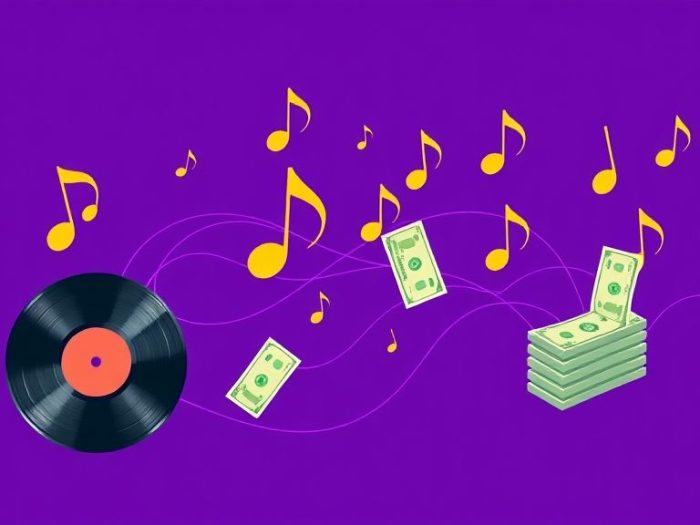Music royalties offer a unique and potentially lucrative avenue for passive income. By
investing in the rights to music, you can earn money whenever those songs are used. This
article explores the world of music royalty investing, explaining how it works and how you can
potentially build a passive income stream from hit songs.
Understanding Music Royalties
Music royalties are payments made to copyright holders for the use of their music. There are
several types of music royalties:
- Performance Royalties: Paid when a song is performed publicly, such as on the radio, TV, or in a restaurant.
- Mechanical Royalties: Paid when a song is reproduced, such as when it’s sold as a physical or digital copy.
- Synchronization Royalties: Paid when a song is used in a visual medium, such as a movie, TV show, or advertisement.
- Streaming Royalties: Paid when a song is streamed on platforms like Spotify or Apple Music.
Why Invest in Music Royalties?
- Passive Income: Earn income without actively creating or performing music.
- Diversification: Music royalties can be uncorrelated with traditional investments.
- Long-Term Income: Popular songs can generate income for many years.
Ways to Invest in Music Royalties
1. Royalty Exchange and Similar Platforms
Platforms like Royalty Exchange and SongVest allow investors to buy and sell shares of existing
music royalty streams.
-
Pros:
- Access to diverse catalogs of songs.
- Relatively easy to get started.
-
Cons:
- Competition can drive up prices.
- Uncertainty about future earnings.
2. Music Royalty Funds
Some investment funds specialize in acquiring music royalties.
-
Pros:
- Professional management.
- Diversification.
-
Cons:
- Higher fees.
- Less control over specific assets.
3. Direct Acquisition
You can purchase royalty rights directly from songwriters, artists, or their estates.
-
Pros:
- Potential for higher returns.
-
Cons:
- Requires legal expertise and negotiation skills.
- High upfront costs.
Factors to Consider Before Investing
- Song Popularity: The more popular a song, the more royalties it’s likely to generate.
- Song Longevity: Some songs have enduring popularity, while others fade quickly.
- Royalty Type: Different royalty types (performance, mechanical, etc.) generate different income streams.
- Catalog Diversification: A catalog with a variety of songs is less risky than one heavily reliant on a few hits.
- Platform Fees: Royalty exchange platforms charge fees.
- Legal Rights: Ensure clear ownership and licensing agreements.
Example
You purchase a share of the royalties from a popular song that’s frequently played on the radio,
streamed online, and used in commercials. You’ll receive a portion of the royalties earned
each time the song is played, streamed, or used in a commercial.
Risks of Music Royalty Investing
- Unpredictable Income: Song popularity can decline, reducing royalty income.
- Legal Disputes: Copyright issues and royalty disputes can arise.
- Technological Changes: Changes in music consumption habits can affect royalty streams.
- Platform Risks: Royalty exchange platforms may have fees or operational risks.
Conclusion
Investing in music royalties can be a fascinating way to generate passive income. However, it’s
essential to conduct thorough research, understand the complexities of the music industry, and
manage risks carefully.
Related Keywords
Music royalties, invest in music royalties, royalty exchange, music royalty funds, music
royalty investment, passive income music, music copyright, music publishing, music streaming
royalties, buy music royalties.
Frequently Asked Questions (FAQ)
1. What are music royalties?
Music royalties are payments made to copyright holders for the use of their music.
2. What are the different types of music royalties?
Types include performance royalties, mechanical royalties, synchronization royalties, and streaming royalties.
3. What are performance royalties?
Performance royalties are paid when a song is performed publicly, such as on the radio, TV, or in a restaurant.
4. What are mechanical royalties?
Mechanical royalties are paid when a song is reproduced, such as when it’s sold as a physical or digital copy.
5. What are synchronization royalties?
Synchronization royalties are paid when a song is used in a visual medium, such as a movie or TV show.
6. Why are music royalties a good investment?
They offer passive income potential, diversification, and the possibility of long-term income from popular songs.
7. How can I invest in music royalties?
You can invest through royalty exchange platforms, music royalty funds, or by directly acquiring royalty rights.
8. What factors should I consider before investing?
Consider song popularity, song longevity, royalty type, catalog diversification, platform fees, and legal rights.
9. What are the risks of investing in music royalties?
Risks include unpredictable income, legal disputes, technological changes, and platform risks.
10. Is investing in music royalties a safe investment?
While it offers potential, it’s not a guaranteed investment and requires careful research and risk management.



